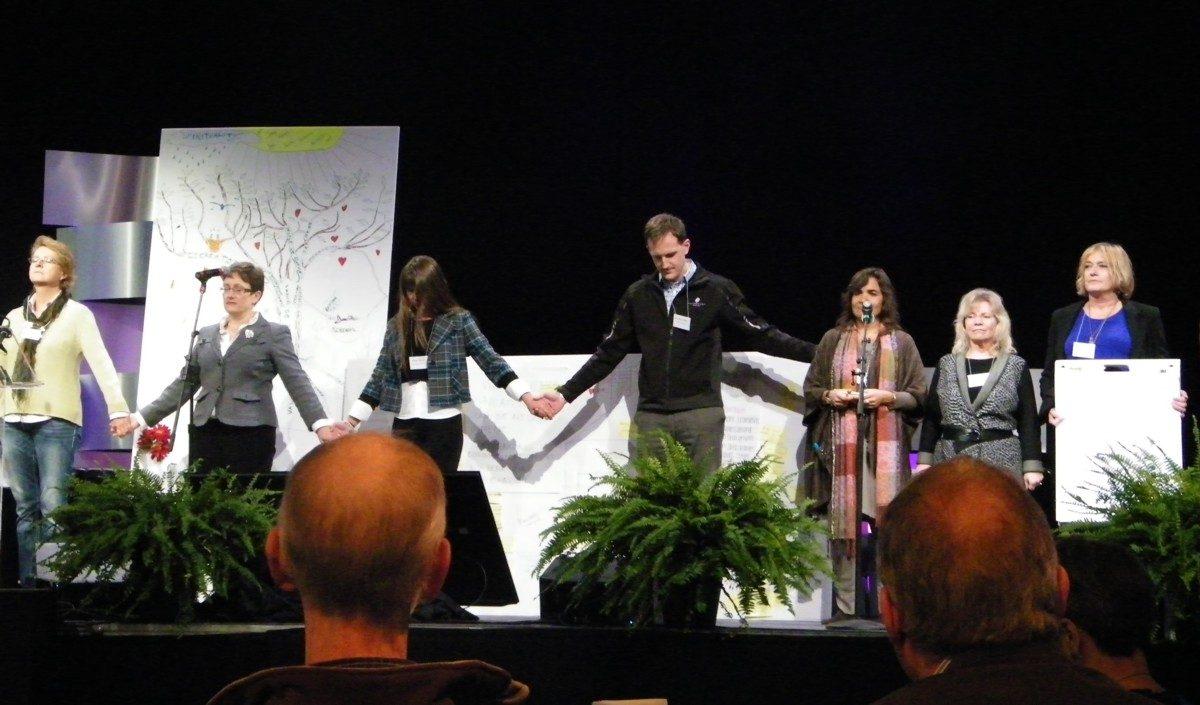
The Flourish & Prosper conference held last week at Case Western Reserve University in Cleveland sought to distinguish itself by moving from ideas to action. With an array of over 40 sustainability notables in attendance, including Naveen Jain, Bart Houlahan, Andrew Winston, Raj Sisodia, Peter Senge, Michael Braungart and many more, there would not only presentations and talks, but also a number of design summits intended to wrestle with a some of the most critical and relevant challenges facing the sustainability movement today.
Day two kicked off with a rousing talk by Raj Sisodia, co-author, along with John Mackey of Whole Foods, of the book Conscious Capitalism First, he went through a brief history of the world, before and after 1989, which, he claims was a massive turning point (fall of Berlin wall, Tiananmen Square, Exxon Valdez spill, Ayatollah Khomeini, the invention of the World Wide Web, and the first time the median age in the U.S. exceeded 40). Then he talked about business as a force and said that “making money is like making red blood cells, we need both to live, but that's not why we live.” We have the opportunity today, he said, “to lead the most meaningful life humans have ever lived.”
Next, Sir Mark Moody-Stuart, former Chairman of Accenture and Royal Dutch Shell spoke about the great challenge that occurs when government doesn't function. Business cannot address this alone. We need partnerships between business and civil society. He spoke of the importance of the UN Global Compact, in which Case Western’s Weatherhead School of Business played an early role. This is the largest corporate citizenship initiative, with 8,000 companies signed up to report against 10 criteria. If they don't report they get kicked out.
Harvard’s Jane Nelson, talked about how, “This is the generation that for the first time has the means to end extreme poverty and boost shared prosperity.”
Opportunity was a key theme throughout the conference, which consisted primarily of business leaders, business school personnel and consultants.
The design summits consisted of eight topics. These were:
- Cities as Centers of Full-Spectrum Flourishing
- Regenerative Agriculture: Feeding without Depleting
- 100% Clean Energy
- Consciousness of Connectedness in the Workplace
- S. Grand Strategy
- New Metrics for Sustainability as Flourishing
- Spiraling the Circular Economy
- Showcasing Business as an Agent of World Benefit
Gil Friend, former CEO of Natural Logic, is now the sustainability manager for the city of Palo Alto. He told the cities group that they were considering bold moves to reach a state of native carbon neutrality by 2017. These might include a climate neutral local utility, a car-free city, a circular economy. Jenita McGowan, Cleveland’s Sustainability Chief, described their efforts as “clarifying, comprehensive, participatory, generative, innovative and welcoming.”
The group spontaneously generated some 150 ideas in the areas of jobs, civic engagement, nature, social, public safety, buildings, sharing, education, wellness, infrastructure, governance, and finance.
Michael Braungart of Cradle to Cradle fame, opened the final day, challenging the audience to be more ambitious in its aspirations for the future. So much that is being done in the name of sustainability, is not taking us far enough. “There are far too many people on this planet,” he said, “for each of us to just be less bad.” He spoke about a triple top line, doing more good, rather than a triple bottom line.
The conference closed with the eight design groups presenting the variety of solutions they generated. Many of the groups have committed to continuing the development of the solutions to the point where they can be made public. A number of thought leader interviews have resulted from this engagement, which you will hear more about in the days and weeks that follow.
Image credit RP Siegel
RP Siegel, PE, is an author, inventor and consultant. He has written for numerous publications ranging from Huffington Post to Mechanical Engineering. He and Roger Saillant co-wrote the successful eco-thriller Vapor Trails. RP, who is a regular contributor to Triple Pundit and Justmeans, sees it as his mission to help articulate and clarify the problems and challenges confronting our planet at this time, as well as the steadily emerging list of proposed solutions. His uniquely combined engineering and humanities background help to bring both global perspective and analytical detail to bear on the questions at hand.
Follow RP Siegel on Twitter.

RP Siegel (1952-2021), was an author and inventor who shined a powerful light on numerous environmental and technological topics. His work appeared in TriplePundit, GreenBiz, Justmeans, CSRWire, Sustainable Brands, Grist, Strategy+Business, Mechanical Engineering, Design News, PolicyInnovations, Social Earth, Environmental Science, 3BL Media, ThomasNet, Huffington Post, Eniday, and engineering.com among others . He was the co-author, with Roger Saillant, of Vapor Trails, an adventure novel that shows climate change from a human perspective. RP was a professional engineer - a prolific inventor with 53 patents and President of Rain Mountain LLC a an independent product development group. RP was the winner of the 2015 Abu Dhabi Sustainability Week blogging competition. RP passed away on September 30, 2021. We here at TriplePundit will always be grateful for his insight, wit and hard work.














